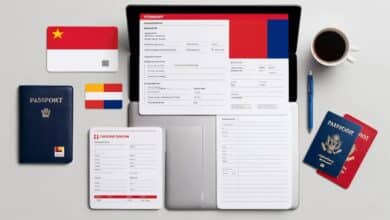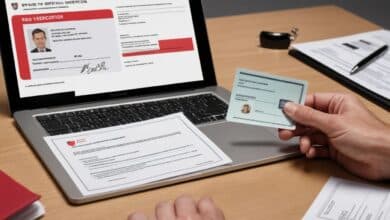Navigate the Benefits and Advantages of Marriage Visas and Sponsorship Visas in the United States with Confidence
For many Nigerian applicants, marriage-based immigration offers a clear path to building a life abroad.
This process allows individuals to reunite with their partners while gaining access to opportunities in a new country. Understanding the steps involved can make the journey smoother and less stressful.
One of the key benefits is the ability to work and travel freely. Applicants often receive authorization to pursue careers and explore their new surroundings. Additionally, knowing the difference between conditional and immediate relative status is crucial for long-term planning.
Government agencies like USCIS and the National Visa Center play a vital role in processing applications. With professional guidance, applicants can navigate common challenges and improve their chances of approval. This support ensures a more confident and informed experience.
Introduction to Visa Sponsorship and Marriage Visas
Marriage-based immigration provides a structured pathway for Nigerian applicants to reunite with their loved ones. This process allows couples to live together while gaining access to opportunities in a new country. Understanding the basics can make the journey smoother and less stressful.
Under U.S. law, marriage-based immigration falls into two main categories: spouse visas and fiancé(e) K-1 visas. Both options require a valid relationship and specific eligibility criteria. Nigerian applicants must meet these requirements to proceed with their visa application.
The process involves two stages: petition approval and the visa application. First, the U.S. citizen or permanent resident sponsor files a petition. Once approved, the applicant can proceed with the next steps. Average processing times for Nigerian applicants range from 12 to 18 months.
Maintaining a valid passport throughout the process is crucial. Without it, delays or denials may occur. Professional immigration services can help applicants navigate these requirements and improve their chances of success.
| Type | Spouse Visa | K-1 Visa |
|---|---|---|
| Eligibility | Already married | Engaged, planning to marry within 90 days of entry |
| Processing Time | 12-18 months | 6-9 months |
| Permanent Resident Status | Immediate | After marriage and additional application |
Choosing the right option depends on individual circumstances. Both paths lead to permanent resident status, but the requirements and timelines differ. Applicants should carefully consider their situation before proceeding.
Understanding the Different Types of Marriage Visas
Navigating the complexities of immigration requires a clear understanding of available options. For couples, the choice between a CR1 visa and an IR1 visa depends on the duration of their marriage. Both options provide a pathway to permanent residency, but their requirements and benefits differ.
CR1 Visa: Conditional Residence
The CR1 visa is designed for couples married for less two years. It grants conditional residence, which means the green card is valid for two years. During this period, the couple must prove their marriage is genuine.
To remove the conditions, the applicant must file Form I-751 within 90 days before the second anniversary. This step ensures the transition to permanent residency. Both partners must provide evidence of their ongoing relationship, such as joint financial accounts or shared property.
IR1 Visa: Immediate Relative Status
For couples married for more than two years, the IR1 visa offers immediate relative status. This visa provides a permanent green card without the need for additional applications. It simplifies the process and reduces paperwork.
Applicants can work and travel freely upon entry. The IR1 visa is ideal for those who have already established a long-term relationship. It eliminates the need for conditional status, offering a smoother transition to permanent residency.
| Type | CR1 Visa | IR1 Visa |
|---|---|---|
| Eligibility | Married for less two years | Married for more than two years |
| Green Card | Conditional (2 years) | Permanent |
| Additional Steps | File I-751 to remove conditions | None |
Choosing the right visa type depends on the duration of the marriage. Both options provide immediate work authorization and a path to permanent residency. Understanding these differences ensures a smoother immigration process.
Eligibility Requirements for Marriage Visas
Meeting the eligibility criteria is essential for a successful immigration process. Applicants must provide proof marriage and meet specific financial requirements. These steps ensure the application is complete and increases the chances of approval.
Proof of Marriage
To establish a valid relationship, applicants must submit proof marriage. This includes joint bank accounts, property deeds, and photos spanning the relationship. For Nigerian cultural ceremonies, additional evidence like traditional marriage certificates may be required.
In cases of polygamous marriages, only the first spouse is recognized under immigration law. Applicants must ensure their documentation aligns with these regulations. For civil registry marriages in Lagos, a checklist of required documents can streamline the process.
Financial Sponsorship Requirements
The sponsor must demonstrate financial stability by meeting the minimum income threshold. This is set at 125% of the federal poverty level, which is $24,650 for a two-person household. The sponsor submits an affidavit support to confirm their ability to provide for the applicant.
If the sponsor’s income is insufficient, a joint sponsor can step in. Recent changes to public charge rules may affect Nigerian applicants, so staying informed is crucial. Proper financial documentation ensures compliance with these requirements.
The Role of the U.S. Sponsor
The U.S. sponsor plays a critical role in ensuring the success of the immigration process. They are responsible for providing financial support and proving their ability to maintain the applicant’s well-being. This section explores the sponsor’s obligations and the evidence required to meet these requirements.
Sponsor’s Financial Obligations
The sponsor must demonstrate financial stability by submitting an affidavit support. This document confirms their ability to meet the minimum income threshold, which is 125% of the federal poverty level. For a two-person household, this amounts to $24,650 annually.
Sponsors are required to provide three years of tax returns and proof of current employment. If their income is insufficient, a co-sponsor can step in. This is particularly helpful for sponsors temporarily residing in Nigeria or those working for multinational companies.
Recent case law has clarified the financial obligations for military spouses, ensuring they meet the same standards. Proper documentation is essential to avoid delays or denials.
Proof of U.S. Domicile
Sponsors must also provide evidence of their U.S. domicile. This includes voter registration, U.S. bank statements, and lease agreements. These documents confirm their intent to reside in the country permanently.
For sponsors living abroad temporarily, maintaining domicile can be challenging. They must demonstrate strong ties to the U.S., such as property ownership or family connections. Multinational employees often use these strategies to meet the requirements.
In cases where the sponsor passes away during the application process, the applicant may face complications. However, recent legal precedents have provided clarity on how to proceed in such situations.
“The sponsor’s role is not just financial; it’s about ensuring the applicant’s smooth transition to lawful permanent status.”
| Requirement | Details |
|---|---|
| Financial Proof | Three years of tax returns, current employment proof, affidavit support |
| Domicile Evidence | Voter registration, U.S. bank statements, lease agreements |
| Special Cases | Co-sponsors, military spouses, multinational employees |
Understanding these obligations helps sponsors prepare effectively. By meeting these requirements, they ensure a smoother path to permanent resident status for their loved ones.
Filing the Petition: Form I-130
Filing the Form I-130 is a critical step in the immigration process for Nigerian applicants. This form initiates the petition for a family member to join their loved one in a new country. Proper preparation and attention to detail can significantly impact the outcome.
Required Documentation for Form I-130
Submitting the correct civil documents is essential for a successful application. Applicants must provide proof of identity, such as a valid passport or birth certificate. Evidence of the relationship, like marriage certificates or photos, is also required.
Common errors include incomplete birthplace documentation or missing signatures. Double-checking all forms and attachments can prevent delays. Professional immigration services can assist in ensuring accuracy.
Processing Fees and Timeline
The filing fee for the Form I-130 is $535, payable through the USCIS online portal. Processing times for Nigerian applicants typically range from 6 to 12 months. Premium processing is available for emergency cases, offering faster results.
Applicants can track their case status using their USCIS online account. If additional information is needed, they may receive a Request for Evidence (RFE) from the Lagos field office. Prompt responses to RFEs are crucial to avoid further delays.
| Details | Information |
|---|---|
| Filing Fee | $535 |
| Processing Time | 6-12 months |
| Premium Processing | Available for emergencies |
Understanding the petition uscis process ensures a smoother experience. By preparing thoroughly and staying informed, applicants can navigate this step with confidence.
National Visa Center (NVC) Process
The National Visa Center plays a pivotal role in processing applications for Nigerian applicants. Once the petition is approved by USCIS, the case is transferred to the NVC. This marks the next step in the journey toward reuniting with loved ones.
Case Number Assignment
After receiving the case, the NVC assigns a unique case number. This number is essential for tracking the application’s progress. Applicants must create a CEAC account to manage their case online.
Nigerian applicants should ensure their contact information is up-to-date. This prevents delays in receiving important updates. The case number is also required for submitting fees and documents.
Submitting Required Fees and Documents
The NVC requires two main fees: $325 for the DS-260 form and $120 for the affidavit of support. These fees can be paid online through the CEAC portal. Once paid, applicants can proceed with document submission.
The document checklist includes police certificates from all countries where the applicant has lived. For Nigerian applicants, certificates can be obtained from Ikoyi or Alagbon offices. Delays in local government processing can occur, so starting early is advisable.
Documents in Yoruba or Igbo must be translated into English. Certified translators should handle this to ensure accuracy. Using secure services like DHL for document submission to the NVC is recommended.
| Step | Details |
|---|---|
| Case Number Assignment | Unique number assigned by the NVC |
| Fees | $325 (DS-260) + $120 (Affidavit of Support) |
| Documents | Police certificates, translations, civil documents |
By following these steps, applicants can navigate the NVC process efficiently. Staying organized and proactive ensures a smoother experience with the department state.
Completing Form DS-260
Completing the DS-260 form is a crucial step for Nigerian applicants in the immigration process. This online form collects detailed information to process visa applications efficiently. Accuracy is vital to avoid delays or complications.
Information Required in Form DS-260
The DS-260 form requires applicants to provide a 10-year travel history and all previous addresses. Additionally, all social media accounts used in the past five years must be listed. This ensures transparency and thorough background checks.
Nigerian applicants should pay special attention to their educational histories. Mistakes in this section can lead to delays. Traditional marriage ceremonies must also be reported accurately to align with legal requirements.
Tips for Accurate Completion
To ensure accuracy, applicants should double-check all entries. Name discrepancies in multiple documents must be addressed. Saving progress frequently allows for multi-session completion, reducing the risk of errors.
Disclosing previous visa application denials is essential. Honesty in this section builds credibility with immigration authorities. Using professional services can help navigate complex sections of the form.
- Avoid common mistakes with Nigerian educational histories.
- Disclose previous visa denials accurately.
- Report traditional marriage ceremonies properly.
- Handle name discrepancies in multiple documents.
- Save application progress for multi-session completion.
Medical Examination and Vaccination Requirements
Medical examinations are a critical step for Nigerian applicants preparing for immigration. These health checks ensure applicants meet the necessary standards for relocation. The process involves visiting authorized panel physicians and completing specific vaccination requirements.
Authorized Panel Physicians
In Nigeria, approved clinics like Q-Life Family Clinic in Lagos and Abuja handle these examinations. Applicants must schedule appointments early to avoid delays. Costs vary between locations, with Lagos typically being more expensive than Abuja.
Required Vaccinations
Mandatory vaccines include MMR, polio, and seasonal influenza. Applicants should gather childhood immunization records from Nigerian hospitals. Missing records may require re-vaccination, so preparation is key.
- Compare costs between Lagos and Abuja medical centers.
- Obtain childhood immunization records early.
- Manage tuberculosis testing requirements carefully.
- Consider special arrangements for pregnant applicants.
- Address medical inadmissibility issues promptly.
By following these steps, applicants can navigate the medical examination process efficiently. Proper preparation ensures compliance with vaccination requirements and avoids unnecessary delays.
Preparing for the Visa Interview
The visa interview is a crucial step in the immigration journey for Nigerian applicants. It’s an opportunity to demonstrate the authenticity of the relationship and ensure all requirements are met. Proper preparation can significantly impact the outcome of the application.
Essential Documents to Bring
Applicants must bring original birth certificates and two passport-sized photos. Additional documents include marriage certificates, proof of ongoing relationship, and financial records. These materials help verify the authenticity of the application.
For Nigerian applicants, traditional marriage certificates or cultural ceremony evidence may also be required. Ensuring all documents are complete and organized prevents delays or complications during the interview.
Common Interview Questions
Interviewers often ask questions to assess the relationship’s validity. Typical questions include: “How did you meet?” and “Can you share details about your wedding?” Applicants should answer honestly and confidently.
Preparing for these questions in advance helps reduce anxiety. Mock interviews with a trusted friend or professional can also improve performance during the actual session.
“The visa interview is not just a formality; it’s a chance to prove your relationship is genuine and meets all legal requirements.”
Additional Preparation Tips
- Dress professionally for the interview to make a positive impression.
- Prepare evidence of ongoing communication, such as WhatsApp logs or money transfer receipts.
- Practice mock interviews to build confidence and refine responses.
- Familiarize yourself with security protocols at the Lagos consulate to avoid delays.
- Be ready to handle requests for documents not previously submitted.
| Preparation Area | Details |
|---|---|
| Documents | Birth certificates, marriage certificates, photos, financial records |
| Questions | How did you meet? Wedding details? |
| Additional Tips | Dress code, relationship evidence, mock interviews, security protocols |
By following these steps, Nigerian applicants can approach the visa interview with confidence. Thorough preparation ensures a smoother process and increases the chances of success.
Understanding Conditional Residence
Conditional residence is a temporary status that requires specific steps to transition to permanent residency. This status is granted to couples married for less than two years. To remove conditions, applicants must file Form I-751 within 90 days before the second anniversary of their green card issuance.
Filing Form I-751 to Remove Conditions
The filing fee for Form I-751 is $680, including biometrics. Applicants must submit this form to USCIS to prove their marriage is genuine. Missing the deadline can result in the loss of permanent resident status.
For Nigerian couples living in different states, the process may involve additional coordination. Recent changes have streamlined interview requirements, making it easier for many applicants to complete this step.
Evidence of Ongoing Marriage
To support the application, couples must provide evidence of their ongoing relationship. This includes joint assets, children’s birth certificates, and joint tax returns. Nigerian cultural events, such as traditional weddings or naming ceremonies, can also serve as proof.
- Submit joint bank statements or property deeds.
- Include photos of shared experiences and family gatherings.
- Provide affidavits from friends or family confirming the relationship.
In cases of divorce before condition removal, applicants may still file individually. Victims of domestic violence have additional options to protect their status. Proper documentation ensures a smoother process.
What to Do If Your Visa Application Is Denied
Facing a visa denial can be overwhelming, but understanding the next steps can help applicants navigate the process. A denial doesn’t mean the end of the road. There are options to appeal, reapply, or address the issues that led to the decision.
Common Reasons for Denial
Several factors can lead to a denied visa application. Fraud suspicions, incomplete documentation, or failure to meet eligibility criteria are among the top reasons. For Nigerian applicants, issues like previous overstays on B1/B2 visas or unresolved criminal records can also cause delays.
To avoid these pitfalls, applicants should double-check all forms and supporting documents. Ensuring accuracy and completeness can significantly improve the chances of approval.
Waiver Application Process
In some cases, applicants may qualify for a waiver. The I-601 waiver is available for those who can demonstrate extreme hardship to a U.S. citizen spouse. This process requires detailed documentation of the hardship scenarios, which can include financial, emotional, or medical challenges.
For Nigerian families, cultural and familial ties can be emphasized to strengthen the case. Using Nigerian court records to clear criminal issues or addressing previous overstays can also help in the waiver process.
- Appeal through the Administrative Appeals Office if errors are suspected in the decision.
- Reapply after addressing the reasons for inadmissibility, such as incomplete documentation.
- Document hardship scenarios specific to Nigerian families to support a waiver application.
- Address previous overstays on B1/B2 visas with clear explanations and evidence.
- Use Nigerian court records to resolve any criminal issues that may have led to the denial.
“A visa denial is not the end of the journey. With the right approach, applicants can overcome challenges and continue their immigration process.”
By understanding the reasons for denial and exploring available options, applicants can take proactive steps to move forward. Whether through appeals, waivers, or reapplications, there are pathways to achieve their goals.
Entering the United States: Port of Entry
Arriving at the port entry is a pivotal moment in the immigration journey. It’s the final step before starting a new chapter abroad. Proper preparation ensures a smooth transition and compliance with immigration laws.
Documents Required at Port of Entry
Applicants must present a valid passport with the approved visa and a sealed envelope from the embassy. These documents are essential for verifying identity and immigration status. Missing or incomplete paperwork can lead to delays or complications.
Secondary inspection may include fingerprint verification and additional questioning. This step ensures the authenticity of the application. Being prepared with all required materials helps streamline the process.
Customs and Border Protection (CBP) Procedures
The customs border protection officers handle the entry process. They verify documents and ensure compliance with immigration regulations. Applicants should answer questions honestly and provide requested information promptly.
For Nigerian arrivals, declaring items like food or medications is crucial. Some items may require additional inspection or documentation. Following CBP guidelines prevents unnecessary delays.
- Choose recommended airports like JFK or Dulles for smoother processing.
- Activate conditional resident status by completing necessary steps at the port entry.
- Obtain an I-551 stamp as a temporary green card until the physical card arrives.
- Handle delays in receiving the physical green card by contacting USCIS for updates.
“The port entry process is a critical step in ensuring a successful transition to a new life.”
Obtaining Your Green Card
Securing a green card is a significant milestone in the immigration journey. It grants permanent resident status, allowing individuals to live and work in the country. Understanding the steps involved ensures a smooth transition.
USCIS Immigrant Fee
Before traveling, applicants must pay the USCIS immigrant fee of $220. This fee is payable online and is essential for the production of the physical green card. Delays in payment can result in longer wait times for the card’s arrival.
For Nigerian applicants, ensuring accurate payment details is crucial. Common issues include incorrect mailing addresses or incomplete payment information. Double-checking these details can prevent unnecessary delays.
Tracking Your Green Card Status
After entry, applicants can track their green card status using the ELIS system. Production typically takes 90-120 days. During this period, applicants receive an I-551 stamp as temporary proof of status.
For those with Nigerian mailing addresses, updating biographical information after marriage is essential. This ensures the card is delivered to the correct address. Replacement procedures are available for lost or stolen cards.
| Step | Details |
|---|---|
| USCIS Immigrant Fee | $220, payable online before travel |
| Production Time | 90-120 days after entry |
| Tracking System | ELIS system for case updates |
| Common Issues | Mailing address errors, updating biographical information |
| Replacement | Procedures for lost or stolen cards |
By following these steps, applicants can ensure a smooth process in obtaining their green card. Proper preparation and attention to detail are key to avoiding delays.
Applying for a Social Security Number
Obtaining a Social Security Number is a vital step for Nigerian immigrants starting their new life. This number is essential for accessing employment, opening bank accounts, and filing taxes. Understanding the process ensures a smooth transition.
Automatic SSN Issuance
If selected on the DS-260 form, the Social Security Number card typically arrives within three weeks of entry. This automatic process simplifies the experience for many applicants. However, delays can occur, so tracking the delivery status through the Lagos consulate is advisable.
Manual SSN Application Process
For those who did not opt for automatic issuance, visiting a local Social Security office is necessary. Applicants must bring an I-94 printout and other required documents. This includes proof of identity and immigration status.
- Check the delivery status through the Lagos consulate if delays occur.
- Prepare required documents like a valid passport and I-94 form.
- Resolve name mismatch issues by providing supporting evidence.
- Understand the importance of the SSN for Nigerian professionals seeking employment.
- Be aware of tax implications if the SSN issuance is delayed.
For Nigerian professionals, the Social Security Number is crucial for employment and financial stability. Delays in obtaining it can affect tax filings and other essential services. Proper preparation ensures a smoother application process.
Living in the United States as a Permanent Resident
Adjusting to life as a permanent resident opens doors to new opportunities and responsibilities. This status allows individuals to live, work, and build a future in a new country. However, it also comes with specific obligations that must be met to maintain status.
Maintaining Permanent Resident Status
To keep permanent resident status, individuals must follow certain rules. Staying in the country for at least 18 months out of three years is a key requirement. Extended stays abroad without proper documentation can risk losing this status.
Tax filing is another important obligation. Dual residents must report income from both countries. Understanding these responsibilities ensures compliance and avoids complications.
- Be aware of voting restrictions for green card holders.
- Manage extended stays in Nigeria with proper re-entry permits.
- Stay updated on recent changes to public charge rules.
Pathway to U.S. Citizenship
For many, the ultimate goal is citizenship. After three years of marriage to a U.S. citizen, individuals become eligible for naturalization. This pathway citizenship requires meeting physical presence and other criteria.
Preparing for the citizenship test is essential. Resources in Yoruba and English can help applicants study effectively. This step marks the final stage in the immigration journey.
“Achieving citizenship is not just a legal process; it’s a commitment to becoming part of a new community.”
- Use study materials in Yoruba/English for the citizenship test.
- Ensure all documentation is accurate and up-to-date.
- Understand the benefits of citizenship, including voting rights.
Conclusion
Navigating the immigration process can be complex, but understanding the key steps ensures a smoother journey. From filing the initial application to preparing for the interview, each milestone requires attention to detail. Maintaining accurate records is essential to avoid delays or complications.
For Nigerian applicants, resources like the US Embassy in Abuja provide valuable support. A final checklist before the interview can help ensure all documents are in order. Seeking accredited legal assistance can also enhance the chances of success.
By staying organized and informed, applicants can approach the visa process with confidence. This journey marks the beginning of a new chapter, offering opportunities for growth and connection. With the right preparation, the path to immigration becomes clearer and more manageable.
For more information explore the official visa website mentioned in this article:
You will be redirected to another website
FAQ
What is the difference between a CR1 and an IR1 visa?
A CR1 visa is for couples married for less than two years and grants conditional permanent resident status. An IR1 visa is for couples married for more than two years and provides immediate relative status without conditions.
What documents are needed to prove a valid marriage?
Proof of marriage may include a marriage certificate, joint financial accounts, photos, and affidavits from family or friends confirming the relationship.
What are the financial requirements for a sponsor?
The sponsor must meet the income threshold set by the Department of State, typically 125% of the federal poverty guidelines, and submit an affidavit of support (Form I-864).
How long does it take to process Form I-130?
Processing times vary but generally take between six months to a year, depending on the workload at USCIS and the specific service center handling the petition.
What happens after the National Visa Center assigns a case number?
After receiving a case number, the applicant must pay the required fees, submit civil documents, and complete Form DS-260 to proceed with the immigrant visa application.
What should I bring to the visa interview?
Bring your passport, civil documents, medical examination results, proof of financial support, and any additional evidence requested by the consular officer.
How do I remove conditions on a CR1 visa?
File Form I-751 within the 90-day window before the conditional green card expires, providing evidence of an ongoing and bona fide marriage.
What are common reasons for visa application denial?
Denials may occur due to incomplete documentation, insufficient financial support, or failure to prove the legitimacy of the marriage.
What documents are required at the port of entry?
Present your passport with the immigrant visa, sealed medical examination packet, and any additional documents requested by Customs and Border Protection (CBP).
How can I track my green card status?
After paying the USCIS immigrant fee, you can track your green card status online using the receipt number provided during the payment process.
Will I automatically receive a Social Security Number (SSN)?
If you requested an SSN during the visa application process, it will be mailed to you automatically. Otherwise, you must apply manually at a Social Security office.
How can I maintain my permanent resident status?
Maintain your status by residing in the U.S., filing taxes, and avoiding prolonged absences without a re-entry permit.
Published on: 28 de May de 2025







